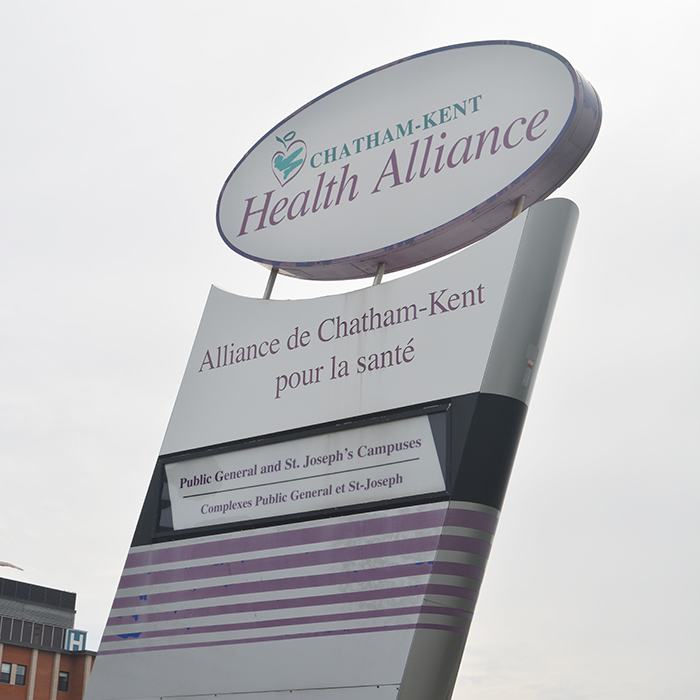A local citizen who saw both his parents have extended stays with the Chatham-Kent Health Alliance in recent years likes the changes that are occurring there, but thinks more can be done.
John Cryderman said he was first exposed to what he calls “unintentional lack of care” issues at the health alliance when his father, Jack Cryderman, was hospitalized in 2010.
“He was in there a few times. The third admission, he was more critical. He couldn’t eat on his own and was aspirating a lot,” Cryderman said. “What I first noticed was the food trays. Each time I would go there, they were left untouched. It became a deep concern of mine.”
The feeding of patients was just one area of worry for Cryderman. He believes there aren’t enough frontline nurses in the medical unit, physiotherapy is conducted by more of a cookie-cutter approach, and information taken at the time of a person’s admittance to hospital is not detailed enough and doesn’t always make it to the hands of the caregivers.
“Every patient is different. What may work for one may not work for another. There is no such thing as one physiotherapy glove fitting all patients,” he said.
Cryderman isn’t pointing fingers at anyone, but rather says it’s a problem with the system.
“There’s nobody to blame. Ultimately there’s a reason why. I’m not advocating there is any intention of malfeasance,” he said. “It’s just the administration is there to manage care, and the frontline staff, from surgeons all the way down to personal support workers, are there to provide the recovery,” he said.
He believes it is at least in part due to not enough staff.
“There are times up there when nurses have between nine and 10 patients each. They’re running their tails off up there. You can’t deliver health care as mandated by the ministry of health in that manner,” he said.
Lori Marshall, president and CEO of the alliance, disagreed.
“We did undergo a benchmarking exercise with a consulting firm. They compared us to other hospitals of similar size and scope of services. In the review, they identified we are spending more to achieve similar levels of quality than other hospitals like us. I would say the report would indicate we, in some areas, have more staff and more spending than others.”
The alliance recently announced plans to increase efficiency, and will reduce full- and part-time staffing levels, and reallocate time where needed.
Lisa Northcott, vice-president and chief nursing executive, said the province has no mandated nurse-to-patient ratio, adding it can depend on the patients’ needs.
“Depending on the level of intensity required, we do vary the level of the nursing staff. In intensive care, it’s common to have one nurse looking after one or two patients,” she said. “In an area such as complex continuing care where the individual needs aren’t as acute, and on nights, we can have fewer nursing staff looking after a larger number of patients.”
In terms of family involvement in the care of a loved one while they are in hospital, Cryderman urges everyone to take interest.
“Family members who come up there, they don’t know. They’re in shock. We have to trust the hospital,” he said.
Northcott said family involvement in a patient’s care differs from family to family.
“We try to welcome every family to have as much involvement as they want to have,” she said. “Some are involved in every aspect of a patient’s care. Other families just don’t want that level of involvement.”
Cryderman said his father wasn’t the only one to have food delivered only for it to remain untouched. He claims upwards of half the meals delivered to patients isn’t eaten.
“With patients like mom in her 90s, they would bring her hard food. A patient doesn’t need steak and eggs when they are 94 and they are aspirating,” he said.
Marshall said nutrition services personnel prepare and deliver the meals, and pick up the trays afterwards.
“Many patients are capable and able to feed themselves. In some areas, we support even more of a communal dining atmosphere where the patients come and eat together. We support that type of socialization,” she said. “But there are a small number of patients who would require some assistance with their meal. Very often family members assist.”
Northcott said when a family member isn’t there, nursing staff or personal support workers, if present, will assist.
In terms of ensuring patients receive meals they can consume, Marshall added nutritional services staff provide some level of choice each day.
When his mother went into hospital, Cryderman said she had hip surgery at the age of 94. She wasn’t restrained and he said she fell out of bed the next morning.
“They didn’t restrain her in bed, nor did I think she had to be restrained, but mom’s habits were to get up in the middle of the night,” he said. “The hospital staff, not knowing about mom’s habits because the admittance questionnaire was not complete, just didn’t know.”
Cryderman added staff didn’t tell him about her fall. Nor were any X-rays taken. In fact, she was due for physiotherapy that afternoon.
“I had to take charge, cancel her physio and ask for an X-ray. She could have really damaged herself had she had physio,” he said. “Even through the intention for the best health care is there, the system isn’t working how it needs to.”
Cryderman said ever since his father’s hospitals stays he’s spoken with other families at the hospital, as well as staff, trying to gather as much information as possible.
“Some of the staff broke down and cried in front of me. They are so stressed. There are inconsistencies in the scheduling and operations up there,” he said.
Cryderman said in the past, his quest for improvements at the alliance essentially fell upon deaf ears.
“I met with (former CKHA CEOs) Ken Tremblay and Colin Patey, but nothing got done,” he said. “Lori (Marshall) seems to be cut from a different mold. She seems to have a responsible, open-door policy,” he said.
Cryderman said he has met with Marshall, hospital supervisor Rob Devitt and director of communications Fannie Vavoulis and is optimistic his concerns were taken seriously.
“Lori and Bob and the group seem to take matters in hand,” he said. “She seems to be reviewing it and is going to get back to me.”
Marshall said administration welcomes comments from the public.
“We appreciate the opportunity to speak with people if they have concerns. We certainly like to be able to intervene right at the time,” she said.
Cryderman said he understands the hospital doesn’t have unlimited resources.
“We cannot expect the hospital to be God. We have to understand even though it’s not supposed to be a funding issue, there is only so much more money to go around,” he said.






